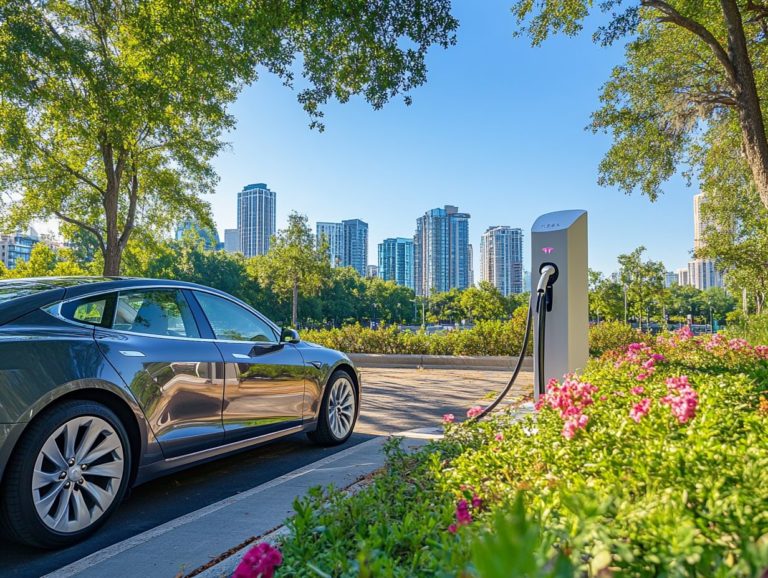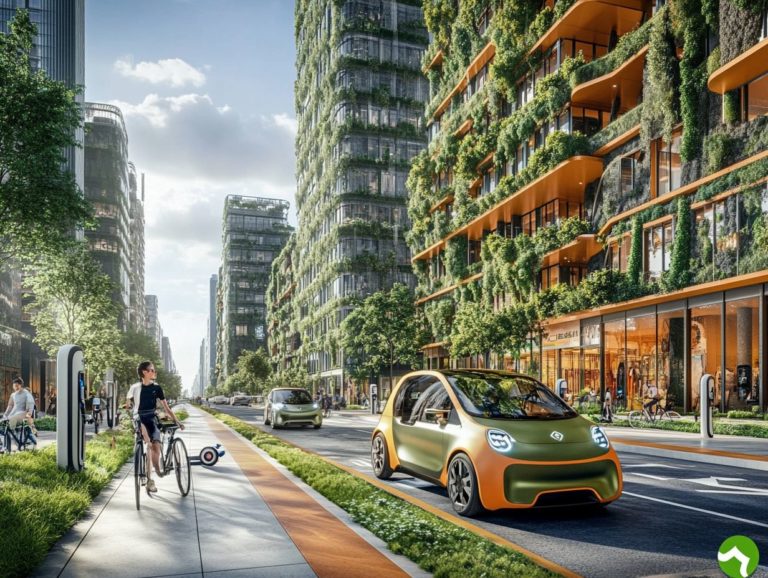Electric Vehicles vs. Traditional Cars: A Comparison
As the world increasingly embraces greener alternatives, the discourse surrounding electric vehicles (EVs) and traditional cars has intensified.
This article highlights the key differences between electric vehicles and traditional cars, examining their environmental impact, cost of ownership, and performance.
It also addresses the convenience of charging infrastructure and key factors to consider when making your choice.
Whether you re a seasoned driver or pondering your first car purchase, this comparison will empower you to make a well-informed decision.
Contents
- Key Takeaways:
- Environmental Impact
- Cost of Ownership
- Performance and Driving Experience
- Infrastructure and Convenience
- Frequently Asked Questions
- What are the main differences between electric vehicles and traditional cars?
- Are electric vehicles more expensive than traditional cars?
- Do electric vehicles have the same driving range as traditional cars?
- What is the environmental impact of electric vehicles compared to traditional cars?
- What Are the Benefits of Owning an Electric Vehicle?
- Are There Any Downsides to Owning an Electric Vehicle?
Key Takeaways:
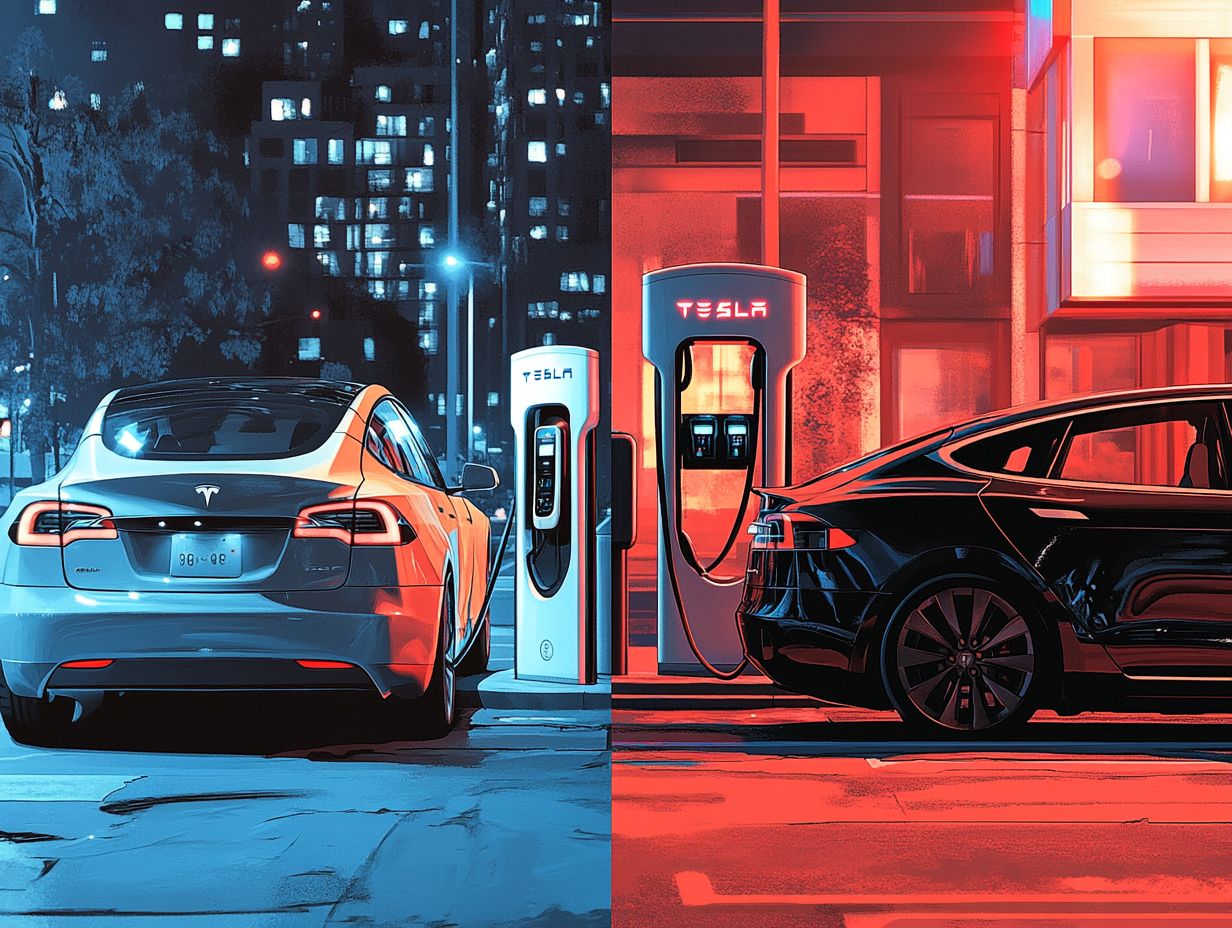
- Electric vehicles have lower emissions and are more sustainable compared to traditional cars, making them a better choice for the environment.
- While electric vehicles may have a higher initial investment, they have lower long-term expenses due to lower fuel and maintenance costs.
- Electric vehicles offer better performance with faster acceleration, longer range, and smoother handling, providing a more enjoyable driving experience.
What are Electric Vehicles and Traditional Cars?
Electric vehicles (EVs) represent a transformative shift in automotive technology, utilizing advanced battery systems and electric power, which contrasts sharply with traditional gasoline vehicles that depend on fossil fuels.
As the automotive landscape evolves, it becomes essential for you whether you’re a consumer, policymaker, or environmental advocate to grasp the fundamental differences between electric and gasoline vehicles.
Key insights from the U.S. Department of Energy and institutions like the University of Michigan shed light on these distinctions, focusing on efficiency, operational costs, and lifetime expenses.
Electric vehicles offer excellent fuel economy, often exceeding 100 MPGe, while the average gasoline-powered car hovers around 25 MPG.
The various components vital for EVs, including electric motors and regenerative braking systems which capture energy usually lost during braking to recharge the battery significantly enhance their efficiency and reduce their environmental impact.
As concerns about climate change grow, federal incentives like tax credits and rebates are being introduced to promote EV adoption. These measures ease worries regarding the initial purchase price, making electric vehicles a more appealing option while paving the way for a cleaner, more sustainable future.
Environmental Impact
The environmental impact of electric vehicles compared to traditional gas cars is a crucial topic as society confronts the challenges of climate change, pollution, and energy security.
Electric vehicles present significant advantages in terms of emissions, notably reducing carbon pollution a critical point emphasized by organizations such as the U.S. Environmental Protection Agency and initiatives from Energy Innovation and Clean Cities.
By switching to EVs, you can enjoy significant climate benefits and help create a healthier planet!
Comparison of Emissions and Sustainability
A thorough comparison of emissions and sustainability between electric vehicles (EVs) and traditional gasoline vehicles reveals a striking advantage for EVs in curbing harmful pollutants and championing sustainable energy sources.
This analysis, bolstered by ongoing transportation research, underscores the pivotal role that adopting electric vehicles plays in effectively mitigating environmental impacts and fostering a sustainable future.
Numerous studies demonstrate that electric vehicles produce zero tailpipe emissions, while gasoline vehicles emit significant quantities of carbon dioxide, nitrogen oxides, and particulate matter.
For example, the U.S. Department of Energy notes that EVs can slash greenhouse gas emissions by 50% or more compared to their gasoline counterparts, particularly when charged with renewable energy sources like wind or solar.
As the energy grid transitions toward more sustainable sources, the overall carbon footprint of electric vehicles is set to decrease further, making a compelling case for their adoption in the fight against climate change and the improvement of air quality.
Cost of Ownership
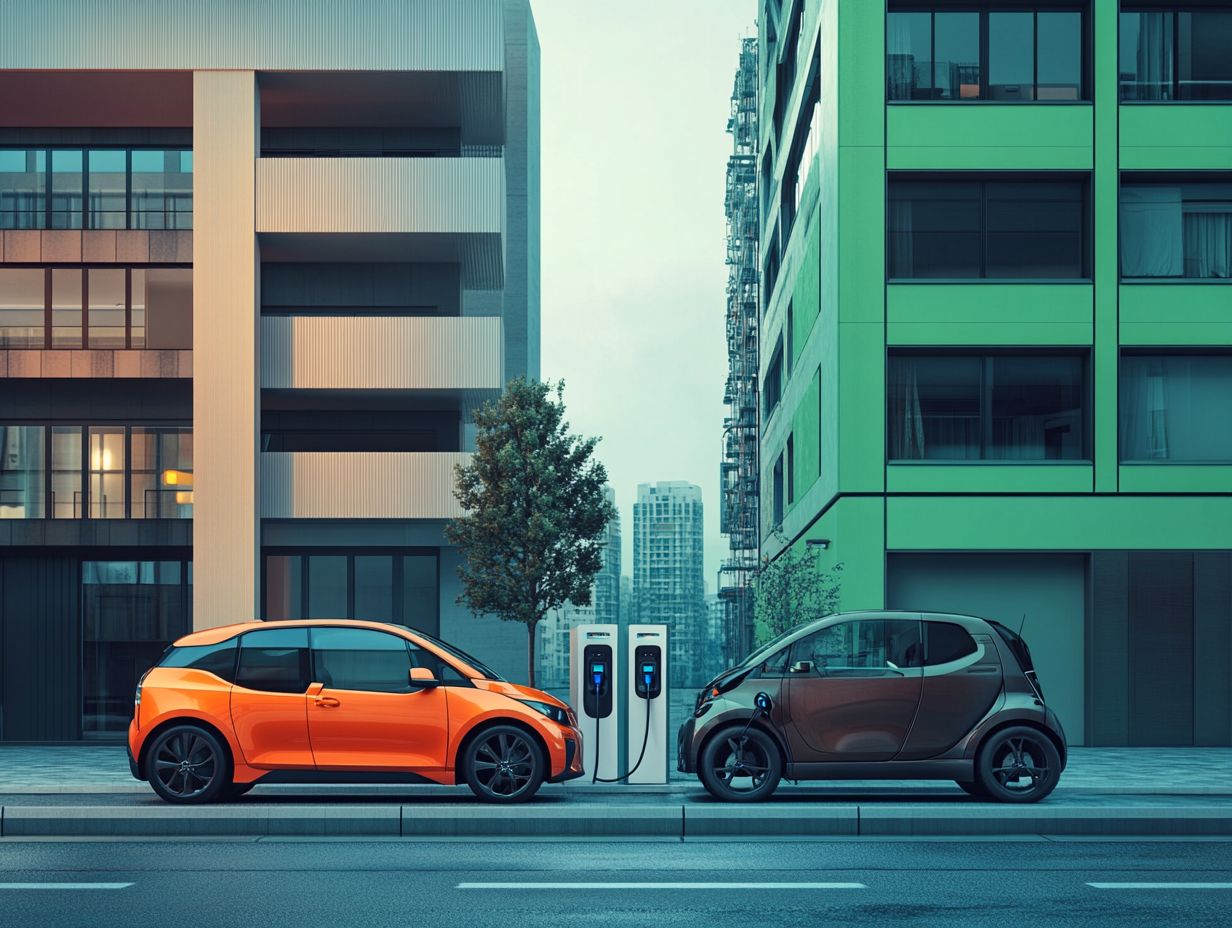
Understanding the cost of ownership tied to electric vehicles versus traditional gas cars is crucial for you as a consumer navigating long-term financial commitments. Key factors like maintenance costs, fuel expenses, and the amount you pay upfront play a vital role in shaping the total cost of ownership, which can significantly influence your decision-making process.
By carefully analyzing these variables, you can create a clearer savings estimate tailored to your driving habits and vehicle preferences.
Initial Investment and Long-Term Expenses
The initial investment and ongoing costs associated with electric vehicles can differ quite a bit from traditional gas cars, shaped by elements like federal incentives and charging expenses. Grasping these financial aspects is essential for anyone considering the switch to electric vehicles.
While the upfront costs might be higher, they can pave the way for significant savings over time in terms of fuel and maintenance. Be sure to take into account the federal tax credits and state incentives that can dramatically lower the initial purchase price of an electric vehicle.
These incentives can make the initial cost more manageable, making electric vehicles a more appealing financial option. In the long run, the lower routine maintenance costs thanks to the simplicity of fewer moving parts in electric vehicles coupled with the generally reduced cost of ‘fuel’ through electricity compared to gasoline, can lead to substantially lower overall expenses.
Make sure to think about these factors they could save you a lot of money when determining the most cost-effective choice for your next vehicle.
Performance and Driving Experience
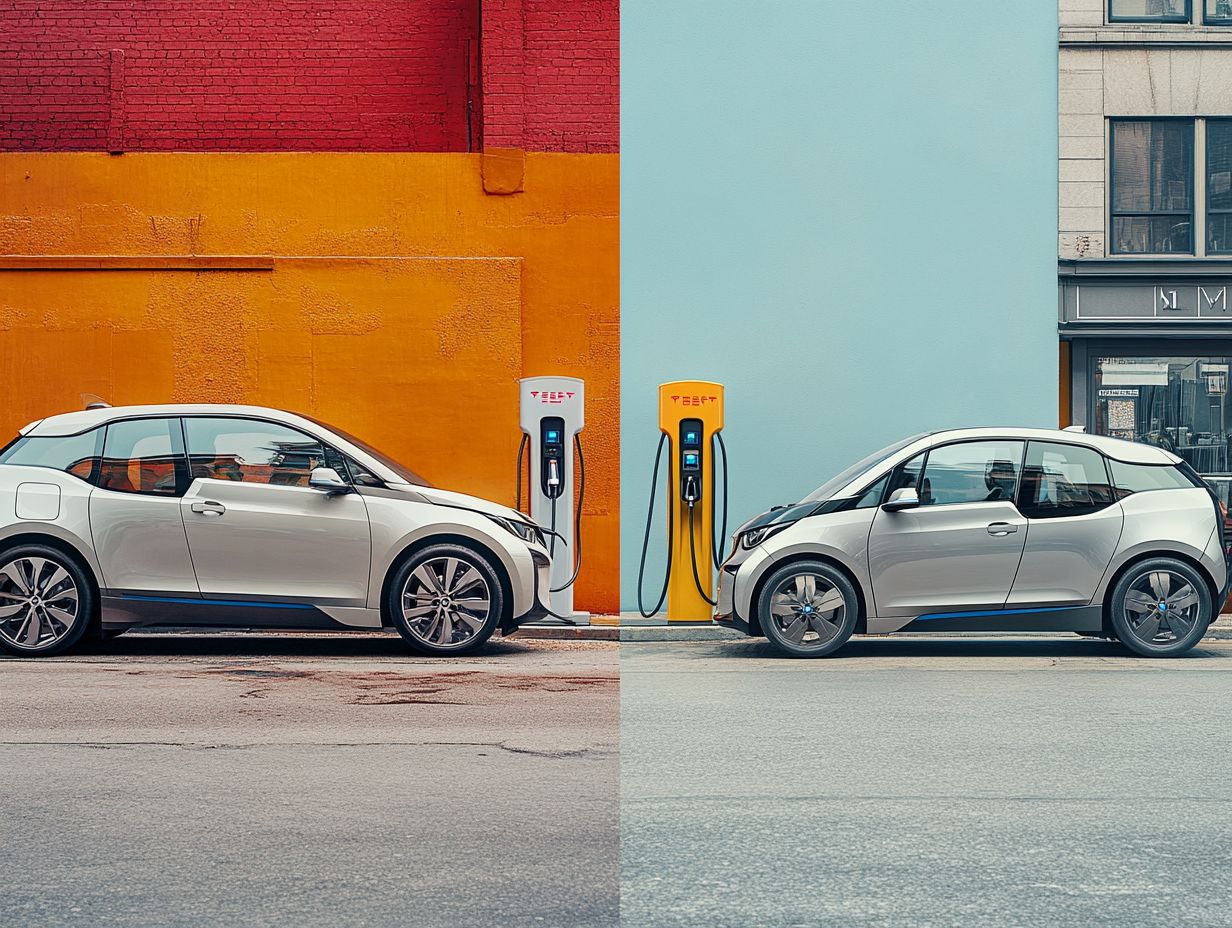
The performance and driving experience of electric vehicles frequently outshine those of traditional gas cars in several critical areas, especially in terms of acceleration, range, and handling. This superiority can be largely credited to advancements in battery technology and the overall efficiency of modern models.
As a result, electric vehicles offer a distinct driving experience, complete with innovative features like a system that helps recharge the battery while you drive, which significantly boosts energy efficiency during your journey.
Acceleration, Range, and Handling
When you delve into the acceleration, range, and handling of electric vehicles compared to gasoline vehicles, you’ll find that EVs often showcase superior performance metrics. This offers an engaging and dynamic driving experience, highlighting various engineering advancements that enhance the performance characteristics of electric vehicles.
For instance, many electric models can rocket from 0 to 60 mph in just a few seconds, often leaving traditional sports cars in the dust, thanks to their instant torque capabilities.
Modern EVs have made significant strides in driving range, with some models exceeding 300 miles on a single charge, effectively alleviating any concerns you might have about long-distance travel.
The handling of electric vehicles is equally impressive! The low center of gravity from battery placement enhances stability and maneuverability, giving you a confident drive.
Real-world testimonials consistently highlight the exhilarating performance of EVs, with drivers noting how these vehicles not only keep pace with but often outshine their gasoline counterparts, all while providing a quieter and smoother ride.
Infrastructure and Convenience
The infrastructure and convenience of electric vehicles hinge significantly on the availability of charging stations and robust charging infrastructure, both of which are vital for a seamless driving experience. As public charging options grow and home charging capabilities improve, you re likely becoming more attuned to the costs associated with charging and how they influence the overall usability and registration of your vehicle.
Availability of Charging Stations and Maintenance
The availability of charging stations is a vital consideration for you as a prospective electric vehicle owner. It directly impacts your convenience and confidence in making the transition to an EV. Alongside ongoing maintenance requirements, understanding the dynamics of public utilities and charging costs will enable you to make informed decisions about your investment in electric vehicles.
A burgeoning network of charging stations both public and private has emerged to meet the surging demand for electric vehicles. As of 2022, over 100,000 public charging points were reported across the United States. This number continues to climb with ongoing infrastructure investments.
Electric vehicles generally require less upkeep compared to their gas-powered counterparts. With fewer moving parts and no need for oil changes, they are designed for efficiency. However, keeping an eye on the batteries is essential, as they may require monitoring and, at times, replacement. This can be a considerable investment, with average costs ranging from $5,000 to $7,000.
By being mindful of these factors, you can navigate your choices with greater clarity.
Factors to Consider in Choosing Between Electric and Traditional Cars
When you re weighing options between electric vehicles and traditional cars, several factors can shape your concerns and preferences. You ll want to consider aspects such as vehicle models, driving distance, energy demand, and grid readiness, all crucial for finding the perfect fit for your unique needs and lifestyle.
It’s essential to reflect on your daily driving habits and the availability of charging infrastructure in your area, as these elements can significantly impact your convenience. If you live in an urban setting, electric options might be more practical due to the abundance of charging stations. Conversely, if you re in a rural location, you may encounter some hurdles.
Don’t miss the chance to evaluate future trends, including advances in battery technology and the movement toward renewable energy sources. Doing so will give you valuable insights into the long-term viability of electric vehicles compared to traditional cars. This will help you make a well-informed decision that aligns with your values and requirements.
Frequently Asked Questions
What are the main differences between electric vehicles and traditional cars?
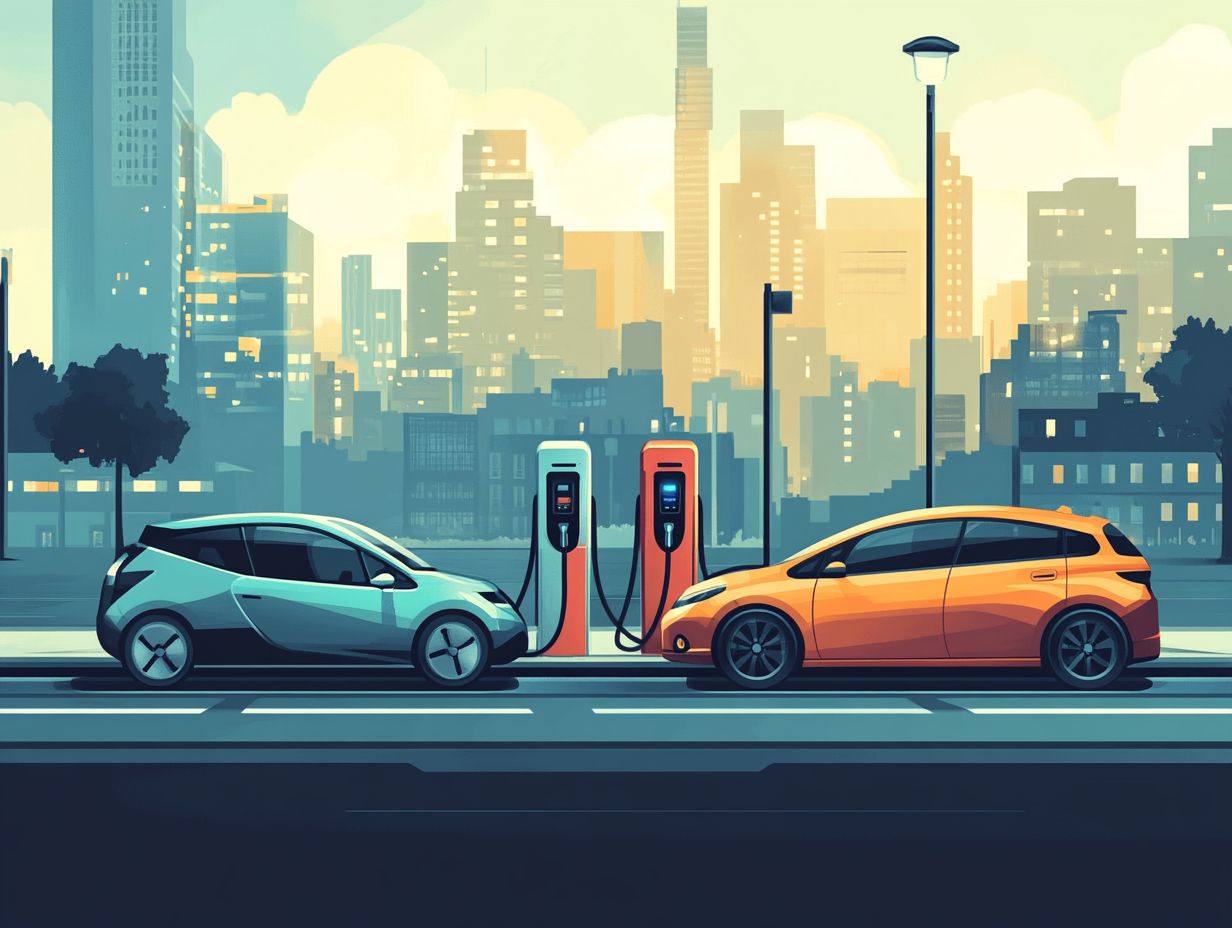
Electric vehicles are powered by rechargeable batteries and use electric motors to drive the vehicle, while traditional cars use gas-powered engines. They also have fewer moving parts and emit no tailpipe emissions, whereas traditional cars have more complex engines and produce harmful emissions.
Are electric vehicles more expensive than traditional cars?
Initially, electric vehicles may have a higher price tag than traditional cars, but they can be more cost-effective in the long run. With fewer moving parts, electric vehicles require less maintenance and have lower fuel costs, making them more affordable to operate.
Do electric vehicles have the same driving range as traditional cars?
The driving range of electric vehicles can vary, but on average, they have a shorter range compared to traditional cars. However, advancements in technology and the availability of charging stations are making electric vehicles more practical for everyday use.
What is the environmental impact of electric vehicles compared to traditional cars?
Electric vehicles produce zero tailpipe emissions, making them more environmentally friendly than traditional cars. However, the production of the batteries used in electric vehicles can have a significant environmental impact. It’s also important to consider the source of electricity used to charge the batteries.
What Are the Benefits of Owning an Electric Vehicle?
Electric vehicles are better for the environment. They also provide a smoother and quieter driving experience.
These vehicles have lower operating costs and come with modern tech features. Some countries offer incentives and tax credits for buyers.
Are There Any Downsides to Owning an Electric Vehicle?
The main downside is the limited driving range and the need to recharge the battery, which means filling it with energy. Long-distance travel can be challenging if charging stations are scarce.
The upfront cost can also be a barrier for some people.


